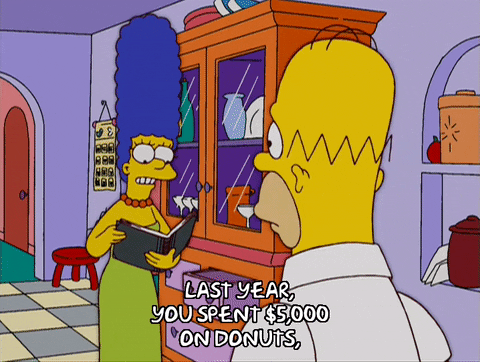I did not spend $5000 on doughnuts in 2024, but I did spend some money on them and have been known to start my day with a run out to Do-Rite Donuts. It’s the nearest doughnut shop to my house, because I don’t count Dunkin’ Donuts anymore.
After I check out, I note how much I spent in my spending spreadsheet before I bite into that Valrhona chocolate frosting.
My income has never been stable. It has varied wildly from year to year. When I worked in finance, bonuses (or the lack thereof) would change my income by a lot. As a freelancer, something as simple as the date that my agent cuts my royalty checks could determine whether one year is a great one and another is not so good.
Needless to say, I know how to live on an uncertain income. It’s a combination of keeping fixed costs low, tracking spending, using a savings account, and treating good periods as an opportunity to invest rather than a time to blow out the bucks.
Some folks reading this are like, yeah, tell me something I don’t know. That’s cool; you can skip to the next thing in your inbox. But if you’re mystified at how anyone can budget without knowing what their income will be, then read on! This is a valuable skill, especially if you’re thinking about a career change, becoming a contractor, or retiring and living off investments. It’s obviously easier to manage a variable income if some of the years are really good. I get that. But understanding the principles might help even if the variability never includes an investment banking bonus.
So, here’s a look at my process:
Keep fixed costs low: The big fixed costs for most people are housing, utilities, basic transportation, and insurance. The lower you can keep these costs, the easier living on a variable income will be. For us, this means opting for a high-deductible health plan and having only one car. We bought less house than we could afford at the time we bought it, and we haven’t moved up. Last year, I switched our phone service, which led to a big drop in our utility bills. The less money you have to cough up on a regular basis, the easier it will be to have a variable income.
Tracking spending: I have an annual budget and a monthly budget. The annual budget is a guess about what my income will be, and the monthly budget reflects what I know will be coming in and going out. I set a different amount for spending (including food, entertainment, clothes, and miscellaneous out-of-pocket expenses) each month, and then I track everything I spend. I do this to make sure that I am staying within my monthly budget as well as to be mindful of where my money goes. I do not track my spending over the long term because I don’t really care about history, so I do not know how much I spent on doughnuts in 2024.
Use a savings account: I keep money in a high-interest savings account that I use as a buffer for my spending. It’s a combination of an emergency fund, tax fund, and fund for big, fixed expenses that I have despite not believing in having big, fixed expenses (e.g., the annual dues for my sailing club).
Treating good times as a period to invest: And not only investing in retirement accounts. When the money is coming in and if my savings account is full, I look for ways to spend responsibly. These periods are good for replacing appliances that are making funny sounds, buying concert tickets for a few months out, and planning trips. I might end up blowing a little on new shoes. If anything is left, it goes into my Health Savings Account or my retirement account. I have no shame about transferring small amounts, either. There are months when I have sent $15 to Vanguard, because why not? It’s more than zero, and that’s what was left over from my spending budget.
Ultimately, these habits give me the power to turn down work that I don’t want to do. It also makes it easier to face retirement knowing that my income will become highly sensitive to market returns.
I’d love to hear from other people who have dealt with variable incomes. What do you do that’s different from my approach?






I am curious how you transitioned from a non budget person to a person who started budgeting. Every year I want to start but I get overwhelmed and quit immediately. lol
In the past I've used 0% interest credit cards to help smooth the transitions between high earning months and low earning months.
One time I cleared off ALL credit card balances and moved them to a 0% card, then made big payments on good money months vs. low-ish payments on less money months.
This strategy can deff be risky if you don't manage it well, but it worked great the few times I've done it and it freed up cash flow when I needed it.